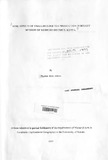| dc.description.abstract | This study is about smallholder tea growing m Belgut Division of Kericho District, Kenya. The last thirty years in Kenya have witnessed rapid agricultural development contributed largely by the small-scale farm sector. In that context, smallholder tea growing has expanded to such an extent that it now accounts for 58.8 percent of all tea produced in the country, with Kenya being one of the leading tea producing countries in the World.
The major objective of this study is to investigate the various socio-economic factors influencing smallholder tea production in Belgut Division, and to test the significance of these socio-economic factors on smallholder tea growing. Using a farm-systems approach, various analytical tools were applied, especially in investigating the significance of the formulated hypotheses. A stratified random sample of 80 smallholder tea growers was selected from Belgut Division and, Analysis of Variance technique -was used to investigate the differences in land allocations to tea production, food crop prod.n and livestock farming among the smallholder tea farmers. The statistical analysis revealed that significant variations existed in land allocated to tea farming, food crops and pasture, resulting in rejection of formulated null hypothesis. Multiple Linear Regression Analysis was applied in trying to relate the variations in cash incomes and expenditures among smallholder tea farmers. The method allowed the researcher to examine the relationship between cash incomes and household and farm expenditures and, further to draw conclusions on sustainability of the tea industry,
relative to such incomes. The results of the Multiple Regression Analysis showed that, among the different expenditures, fertilizers were the most expensive, consuming most of the farmers incomes. Stepwise Multiple Regression Analysis was found useful in selecting most precise variables in predicting tea production among such different factors as age, education, labour, transport and hectarage for tea within the study area. The findings revealed that the relationship between tea production and these variables is significant, (all values of R2 => 0.78), thus prompting the rejection of the formulated null hypothesis.
According to the research findings, problems of land-use competition resulted in lack of labour, low incomes, and food shortages. These socio-economic factors were mainly found on farms less than 0.86 hectares, while larger farms obtained enough incomes from tea and, therefore, could afford to buy food and hire labour whenever there was need. Research findings on incomes and expenditures established that, many smallholder tea farmers spent more money on tea production than the incomes earned. It. was established that many farmers obtained incomes which could not cater for all their required farm and household expenditures. Thus, contrary to expectation, at least one third of the farmers growing tea were found to be making losses rather than benefiting from the cash crop. These farmers, therefore, engage in other activities to earn additional income, for example, providing off-farm employment, planting vegetables, and practicing dairy farming. The analysis using Stepwise Multiple Regression showed that age, education, labour, transport and hectarage for tea influence smallholder tea farming, with labour and hectarage of tea being the most precise
variables in predicting production, hence tea yields. Other problems facing small-
scale tea farming are also discussed in this thesis, in particular, the role played by
the Kenya Tea Development Authority (KTDA), the main institution charged
with promoting smallholder tea development in Kenya over the last thirty years.
It was found out that most smallholder tea growers are very dissatisfied with the
operations of the Kenya Tea Development Authority. As a result, the institution
was blamed for lack of extension services, low prices, poor tea roads, high
fertilizer costs and delayed payment for tea delivered, which influence the success
of smallholder tea development.
On the basis of the findings, it is concluded that socio-economic factors are very
important in explaining the efficient functioning of smallholder tea farming.
Smallholder tea farmers, therefore, do not always benefit sufficiently from such
an important crop as tea, due to the high cost of inputs, for example fertilizers,
and the unsatisfactory payments made to tea growers at the end of the process.
Arising from the study, it is recommended that the Government, through the
Kenya Tea Development Authority, should review some of its policies concerning
smallholder tea in order to properly address the issues of (a) the tea payments to
smallholder farmers, (b) improvement of transport services, (c) introduction of
subsidies on fertilizer costs, and; (d) provision of extension services. The study
recommends that further research is required to establish the spatial variations of
incomes among other farm enterprises to demonstrate the greater profitability of
these enterprises as compared to tea. | en |

